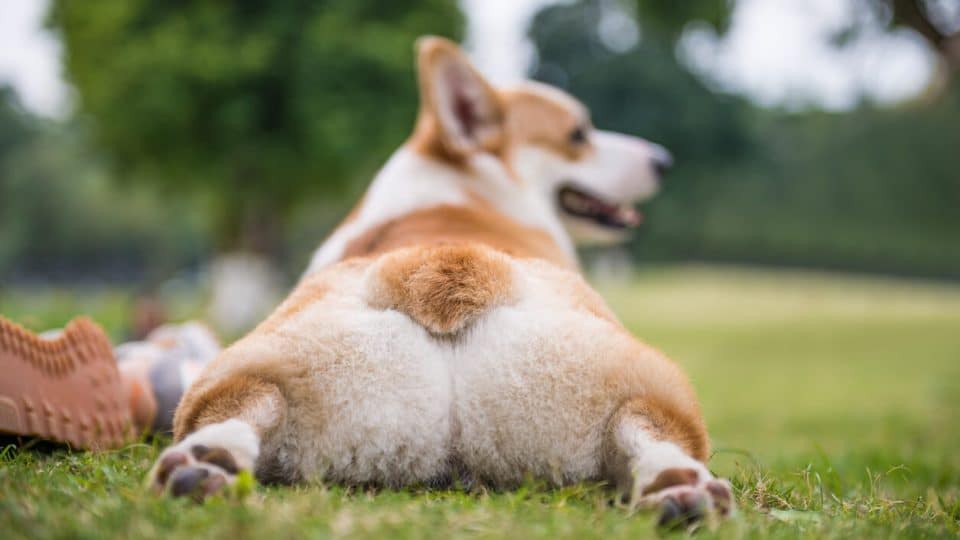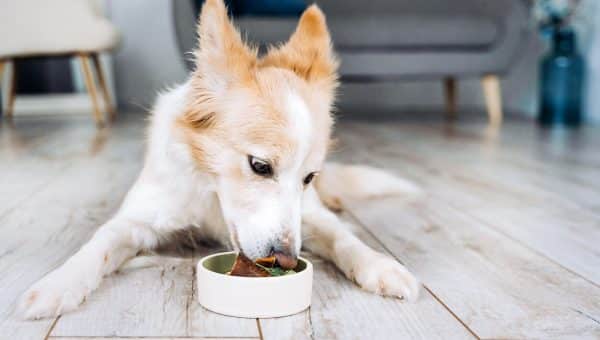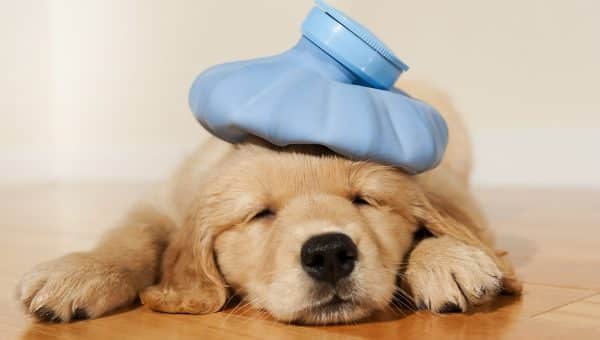- Not a substitute for professional veterinary help.
The sound (and stench!) of your dog’s farts may catch you off guard, but it’s completely natural for dogs to fart.
The frequency of a dog’s farts can vary widely, based on their diet, health, size, breed, and activity level, says Dr. Sabrina Kong, DVM, a veterinary consultant at We Love Doodles.
But while occasional farting is pretty common, excessive or especially foul-smelling gas could point to a digestive issue or food intolerance that may need vet attention, she adds.
We spoke with veterinarians to get to the bottom of why dogs fart, along with a few tips on how to reduce and prevent flatulence
7 Reasons Why Dogs Fart
All dogs break wind from time to time, though you may notice some of those farts more than others.
Several different factors can contribute to flatulence in dogs.
1. Breed
Some breeds are more predisposed to flatulence, particularly brachycephalic dogs with short noses, like Bulldogs and Pugs, Dr. Kong says. This is because their anatomy can cause them to swallow more air when eating, which leads them to produce more gas.
2. Age
Puppies and senior dogs may experience more flatulence than young adult dogs.
“Younger dogs may experience more flatulence as their digestive systems are still developing,” Dr. Kong says. “Older dogs might also have increased gas due to slower digestion.”
3. Size
Have a big dog who has excessive gas? Dr. Kong explains that larger dogs may have a slower digestive process, which can lead to increased gas production.
4. Weight
Similar to bigger dogs, overweight or obese dogs can also experience a slower digestive process.
If your vet recommends your dog lose some weight, following any feeding and exercise guidelines they suggest can help reduce flatulence—and improve your dog’s health.
5. Activity level
A sedentary lifestyle may slow down digestive processes in dogs. Increasing the amount of physical activity they get each day can help them have better digestion and minimize farting.
Additionally, exercising right after eating can cause puppies and adult dogs to get gassy.
6. Eating habits
Does your canine companion tend to scarf down their food or eat a lot? These eating habits may contribute to flatulence.
If you’ve recently switched your dog to a new food without gradually transitioning out the old food, you may also notice increased gas until their system adjusts.
7. Diet
Certain foods, ingredients, and additives can cause dogs to become gassy or have smelly farts, especially if they have an intolerance or allergy. These may include:
- Soy foods (e.g. soybeans, beans, peas)
- Milk and dairy products
- Fermentable fibers like lactulose, oat bran, psyllium)
- Fresh or dried fruit
- Canned foods that contain carrageenan
- Spicy foods and food additives
- Cruciferous vegetables like broccoli, cabbage, and cauliflower
- Spoiled food
How To Stop Dog Farts
Dog farts come with pet parent territory, and you probably can’t get rid of your dog’s farts altogether.
That said, you can take steps to help reduce the amount of gas your dog experiences.
These tips from Dr. Kong can help:
- Incorporate a slow feeder bowl into your dog’s daily feeding: A slow feeder bowl can help slow down mealtime for dogs who eat quickly, which can reduce the amount of air they swallow as they eat. The end result? Less gas.
- Add probiotics to your dog’s diet: Probiotics can help dogs maintain healthy gut flora and improve their digestion, both of which can help reduce gas.
- Avoid large meals: “Feeding your dog smaller, more frequent meals can help manage gas by not overwhelming their digestive system,” Dr. Kong says. Make sure to avoid giving any human food or table scraps. Many human foods can upset a dog’s stomach and cause gas, among other concerns.
Another tip: Consider taking your dog out for a bathroom trip about 30 minutes after a meal so they can pass gas or poop.
Tips To Manage Dog Farting
Some dogs may be more prone to farting more than others—but there are things you can do to manage and prevent excessive farting and help improve their digestion at the same time.
Diet
If you often hear your dog’s stomach making noises, you might consider talking to a vet about their diet.
One of the most effective ways to prevent excess flatulence in dogs is choosing a food that agrees with their digestion.
“Ensuring your dog has a balanced diet will be key in reducing any gastrointestinal (GI) issues,” says Dr. Whitney Miller, DVM, MBA, DACVPM, Chief Veterinarian at Petco. She recommends increasing quality protein to help reduce gas since it’s easy to digest.
You can also try cutting back (or completely eliminating) any foods your dog is sensitive to, like dairy.
Dr. Kong agrees, adding that a change in diet can do a lot to reduce flatulence.
Choose highly digestible, quality dog foods, and slowly transition your dog to a new diet if gas is an issue. You can also feed a mix of dry and canned foods.
Making adjustments to your dog’s feeding schedule—like offering more small meals instead of one big one—can also help them digest food more easily and reduce gas.
Supplements
If you’re looking to support your dog’s overall gut health and reduce flatulence, Dr. Miller says certain supplements, like probiotics, can help. Additionally, zinc acetate and Yucca schidigera have may help minimize flatulence odors.
Just make sure to ask your vet before you give your dog any new supplements. They can offer more guidance about the right wellness plan for your dog and recommend the most helpful supplements based on your dog’s specific needs.
Exercise
Physical activity, from indoor play sessions to a good run outside, can kickstart your dog’s digestive system and help gas exit the body naturally, Dr. Miller says.
Aim to wait at least an hour after your dog finishes their meal before any vigorous exercise.
Regular exercise can also help your dog maintain a healthy weight, which may also help prevent farting.
Minimize stress
“Just like humans, anxiety can increase gastrointestinal discomfort in dogs and result in more gas than normal,” Dr. Miller says. To combat this issue, she recommends giving your dog a calming treat and asking your vet about anti-anxiety medication.
When To Ask A Vet About Dog Farting
“In most cases, dog flatulence is not an indicator of a serious condition and can be easily addressed with at-home remedies,” Dr. Miller says.
She does recommend consulting a vet if you notice that changes in flatulence happen with any of these GI symptoms:
In some cases, certain health conditions may cause a dog to pass gas frequently. Examples include:
- Irritable bowel syndrome (IBS)
- Intestinal parasites
- An inflamed colon or intestine (canine colitis or inflammatory bowel disease)
- Pancreatitis
- Exocrine pancreatic insufficiency (EPI)
- Cancer
If you notice persistent flatulence in your pup along with any other unusual symptoms, visit your vet so they can take steps to find the underlying cause and develop a treatment plan.







